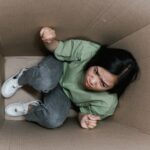A study indicates that about 12.5% of the world’s population is impacted by claustrophobia, but only a few of them seek treatment for it. Claustrophobia is a specific phobia. A specific phobia is a form of anxiety disorder where people have an intense and irrational fear of certain objects or situations. Thus, claustrophobia is indeed a form of anxiety disorder.
What is Claustrophobia?
Claustrophobia is generally defined as an intense fear of closed or confined spaces. A person suffering from claustrophobia might experience panic in closed places such as lifts, cars, aeroplanes, etc. They often fear that something might happen to them in closed spaces, leading to a lack of oxygen. Claustrophobia can be an extremely distressing condition as it tends to have a significant negative impact on a person’s daily life and functioning.
Understanding the symptoms of claustrophobia
For someone suffering from claustrophobia being in closed places can trigger fears such as not being able to breathe properly, facing a lack of oxygen or feelings of being suffocated or restricted. As claustrophobia is a form of anxiety disorder, the symptoms of claustrophobia are similar to those of anxiety. Typical symptoms of claustrophobia are:
- Extreme fear of closed places
- Avoiding small or closed places
- Consistent worry about being trapped in closed places
- Feeling suffocated or having difficulty breathing in small spaces
- Feeling overwhelmed and trying to leave smaller spaces or rooms
- Fear of fainting in closed spaces
- Knowing the fear is irrational, but facing difficulties in controlling it
Additionally, claustrophobia might also lead to physical symptoms such as:
- Heavy sweating
- Heavy breathing or being short of breath
- Rapid heartbeat
- Dry mouth
- Chest Pain
- Fainting
- Feelings of numbness
It is important to note that the above symptoms have been mentioned for informational purposes and should not be used to diagnose anyone. A diagnosis of claustrophobia can only be done by a trained psychiatrist or mental health professional.
What situations can trigger Claustrophobia?
The symptoms of claustrophobia can typically be triggered in closed places or places where people feel trapped. Some situations that can trigger claustrophobia are:
- Being in crowded places
- Walking through a tunnel
- Being in a train or aeroplane
- Being in elevators
- Public toilets
- Rooms with locked doors or windows
How does claustrophobia impact daily life?
Claustrophobia can have a significant impact on a person’s daily life as it is likely to make them avoid situations or spaces that can cause anxiety. Some effects of claustrophobia on daily life are:
- People with claustrophobia may often go to great lengths to avoid situations that provoke their anxiety. This can include avoiding elevators, crowded rooms, public transportation, tunnels, and any other environments perceived as confined, limiting their ability to engage in important activities
- They may also avoid taking up jobs that require a lot of air travel or the use of elevators
- Chronic stress and anxiety caused by claustrophobia might hurt their physical health
- It decreases the overall quality of life of a person by reducing their access to various places and situations.
Conclusion:
Claustrophobia is a complex form of anxiety disorder, that goes much beyond just the avoidance of closed places. It can be severely distressing and limiting for the people suffering from it. Recognizing the significant impact of this condition on people is crucial for creating an understanding and providing support. Claustrophobia can be treated with a combination of therapy, medications, effective coping techniques and social support. If you find yourself or anyone around you suffering from this condition, it is advisable to seek support at the earliest.
References:
- Claustrophobia: Causes, symptoms, and treatments. (2017, June 23). https://www.medicalnewstoday.com/articles/37062
- Claustrophobia: What Is It, Symptoms, Causes & Treatment. (n.d.). Cleveland Clinic. Retrieved November 23, 2023, from https://my.clevelandclinic.org/health/diseases/21746-claustrophobia
- Services, D. of H. & H. (n.d.). Claustrophobia. Department of Health & Human Services. Retrieved November 23, 2023, from http://www.betterhealth.vic.gov.au/health/conditionsandtreatments/claustrophobia
- Сalmerry. (2021, July 28). Claustrophobia: Triggers, Symptoms, Causes, Treatment. https://calmerry.com/blog/anxiety/what-is-claustrophobia-everything-you-need-to-know/

